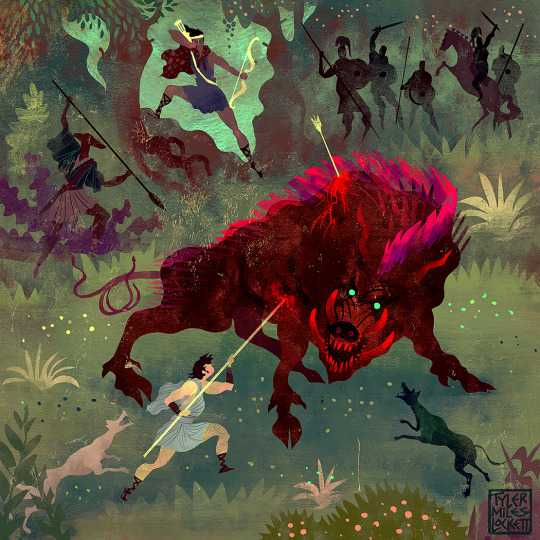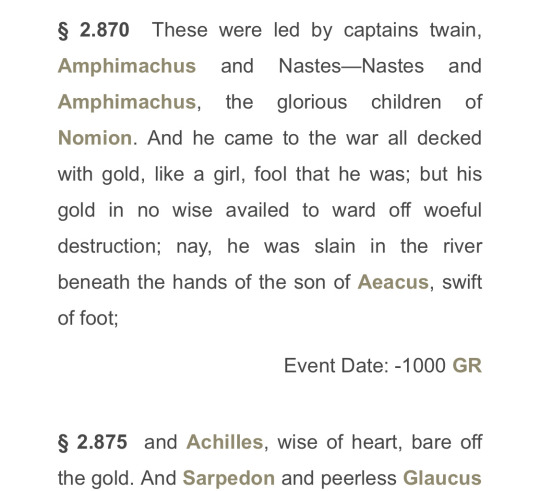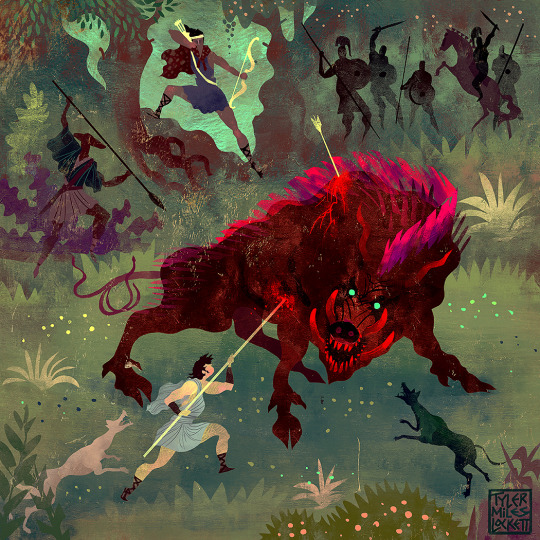#i have prothous
Text
the danaan troops are all lining up outside my tent to beg for me to return to Battle. And i dont give a shit.
#book 9#book 12#i am once again asking#if anyone wants one of my catalogue of ships urls#i will make a tag for this so yall can see the account names#all aside from nobodyhorse polyxenus#are available#another one too but im forgetting which one#THE MACHAON SPELT WRONG ONE#yeah the other ones r all able to be given to u just let me know#im gonna have to tag all individually#cause the tag wont work on the post#prothous#leonteus#clonius#prothoenor#guneus#podarces#ialmenus#elephenor#menestheus#agapenor#amphimachus#thalpius#pheidippus#antiphus#polypoetes#catalogue of ships
14 notes
·
View notes
Text

Atalanta #6 "the Hunt for the Calydonian Boar"King Oineus of Calydon makes the egregious mistake of not sacrificing and offering the first fruits of the Season to Artemis (Homer). The wrathful goddess unleashes the giant Calydonian boar to trample the citizens and ravage the crops of the kingdom. The king sends out a summons and Atalanta, Theseus, Jason, Peleus and many other great heroes answer the call to fell the beast. It is Atalanta's arrow that draws first blood (Ovid) but the King's son, Meleager, who strikes the deathblow. Meleager, having fallen in love with Atalanta, offers her the Boar's hide as trophy. But this causes a rift with the royal uncle who deems a woman unworthy of such an award, and when the argument comes to blows, Meleager kills his two uncles, Prothous and Cometes, by the sword. Meleager's mother, and sister to his uncle, Queen Althaea, enraged by the murder, throws a wood log magically tied to Meleager's lifespan into the fire, killing him instantly.This most famous hunting episode in Greek mythology was said to have taken place a generation before the Trojan war. I find this aspect of the wooden log which was supernaturally linked to Meleager's lifespan to be quite fascinating. The playwright Euripides wrote a play based on the character called "Meleager" of which only fragments remain. The first mention of the Calydonian boar hunt occurs in Homer's ||iad with no reference to Atalanta's involvement. It's Ovid and Apollodorus who include Atalanta into the hunt.The motif of a king sending out heralds to plead for help from worthy heroes brings to mind the epic of Beowulf (6th century C.E.) who answers the plea of a kingdom suffering from the attacks of Grendel. No doubt this tale held special importance for ancient Greeks, emphasizing the dangers of neglecting the gods and goddesses, and the potential for brave individuals to overcome impossible oddsLike this art? It will be in my illustrated book with over 130 other full page illustrations coming in Aug/Sept to kickstarter. to get unseen free hi-hes art subscribe to my email newsletter
Follow my backerkit kickstarter notification page.
Thank you for supporting independent artists! 🤘❤️🏛😁
#hormer#Atalanta#meleager#hellenism#greekmythology#greekgods#pjo#mythology#classics#classicscommunity#myths#ancientgreece
67 notes
·
View notes
Text

achilles homophobic moments
#topos texts is so good to me in specifying exact mentions of names#but also so evil in not always taking me exactly to them in the text#redeemed only by revealing shit like this though#scrolled too long for prothous and found a homophobic achilles moment#that does remind me tho. if anyone wants a url from the catalogue of ships let me know because i have a bunch of them saved#because of that one adriles joke#the iliad#tagging this made me realize how ancient my iliad tag is what the fuck lol#tagamemnon#mine
10 notes
·
View notes
Text

King Oineus of Calydon makes the egregious mistake of not sacrificing and offering the first fruits of the Season to Artemis (Homer). The wrathful goddess unleashes the giant Calydonian boar to trample the citizens and ravage the crops of the kingdom. The king sends out a summons and Atalanta, Theseus, Jason, Peleus and many other great heroes answer the call to fell the beast. It is Atalanta’s arrow that draws first blood (Ovid) but the King’s son, Meleager, who strikes the deathblow. Meleager, having fallen in love with Atalanta, offers her the Boar’s hide as a trophy. But this causes a rift with the royal uncle who deems a woman unworthy of such an award, and when the argument comes to blows, Meleager kills his two uncles, Prothous and Cometes, by the sword. Meleager’s mother, and sister to his uncle, Queen Althaea, enraged by the murder, throws a wood log magically tied to Meleager’s lifespan into the fire, killing him instantly.
This most famous hunting episode in Greek mythology was said to have taken place a generation before the Trojan war. I find this aspect of the wooden log which was supernaturally linked to Meleager’s lifespan to be quite fascinating. The playwright Euripides wrote a play based on the character called “Meleager” of which only fragments remain. The first mention of the Calydonian boar hunt occurs in Homer’s Iliad with no reference to Atalanta’s involvement. It’s Ovid and Apollodorus who include Atalanta into the hunt.
The motif of a king sending out heralds to plead for help from worthy heroes brings to mind the epic of Beowulf (6th century C.E.) who answers the plea of a kingdom suffering from the attacks of Grendel. No doubt this tale held special importance for ancient Greeks, emphasizing the dangers of neglecting the gods and goddesses, and the potential for brave individuals to overcome impossible odds
Thanks for looking and reading! :D To see more of my Greek myth illustrations: https://linktr.ee/tylermileslockett
#tagamemnon#mythology tag#greekmyths#pjo#percyjackson#classical literature#dark academia#classicscommunity#atalanta#artemis#ephesus#aphrodite#goddess#greek#roman#ancient greece#argo#argonautica#calydonian boar#heroine#archer#greek mythology#rome#ovid#mythology art#gods#goddesses#pagan#hellenism#hellenic polytheism
502 notes
·
View notes
Text
Atalanta #6 "the Hunt for the Calydonian Boar"
King Oineus of Calydon makes the egregious mistake of not sacrificing and offering the first fruits of the Season to Artemis (Homer). The wrathful goddess unleashes the giant Calydonian boar to trample the citizens and ravage the crops of the kingdom. The king sends out a summons and Atalanta, Theseus, Jason, Peleus and many other great heroes answer the call to fell the beast. It is Atalanta's arrow that draws first blood (Ovid) but the King's son, Meleager, who strikes the deathblow. Meleager, having fallen in love with Atalanta, offers her the Boar's hide as trophy. But this causes a rift with the royal uncle who deems a woman unworthy of such an award, and when the argument comes to blows, Meleager kills his two uncles, Prothous and Cometes, by the sword. Meleager's mother, and sister to his uncle, Queen Althaea, enraged by the murder, throws a wood log magically tied to Meleager's lifespan into the fire, killing him instantly.
This most famous hunting episode in Greek mythology was said to have taken place a generation before the Trojan war. I find this aspect of the wooden log which was supernaturally linked to Meleager's lifespan to be quite fascinating. The playwright Euripides wrote a play based on the character called "Meleager" of which only fragments remain. The first mention of the Calydonian boar hunt occurs in Homer's ||iad with no reference to Atalanta's involvement. It's Ovid and Apollodorus who include Atalanta into the hunt.
The motif of a king sending out heralds to plead for help from worthy heroes brings to mind the epic of Beowulf (6th century C.E.) who answers the plea of a kingdom suffering from the attacks of Grendel. No doubt this tale held special importance for ancient Greeks, emphasizing the dangers of neglecting the gods and goddesses, and the potential for brave individuals to overcome impossible odds
Like this art? It will be in my illustrated book with over 130 other full page illustrations coming in Aug/Sept to kickstarter. to get unseen free hi-hes art subscribe to my email newsletter
Follow my backerkit kickstarter notification page.
Thank you for supporting independent artists! 🤘❤️🏛😁
#hormer#Atalanta#meleager#hellenism#greekmythology#greekgods#pjo#mythology#classics#classicscommunity#myths#ancientgreece
7 notes
·
View notes
Text
those kings you swore a pact to fight for 4 yrs ago, reminding you Via email, that now is the perfect time for you to go to War for them
#odysseus#mainly. but also#agamemnon#menelaus#and i guess?#helen#skyros#also. i put in the tags on my main but. if anyone wants a danaan commander url from the catalogue of ships#i have a bunch saved from adriles jokes#that i dont really use or need#so if u want it...lemme know#i have prothous#prothoenor clonius ialmenus#elephenor menestheus agapenor amphimachus#thalipus phedippus guneus antiphus#podarces polypoetes#i have machaon but spelt wrong too#also leonteus#i also have another one but i use that as an archive for references so
15 notes
·
View notes